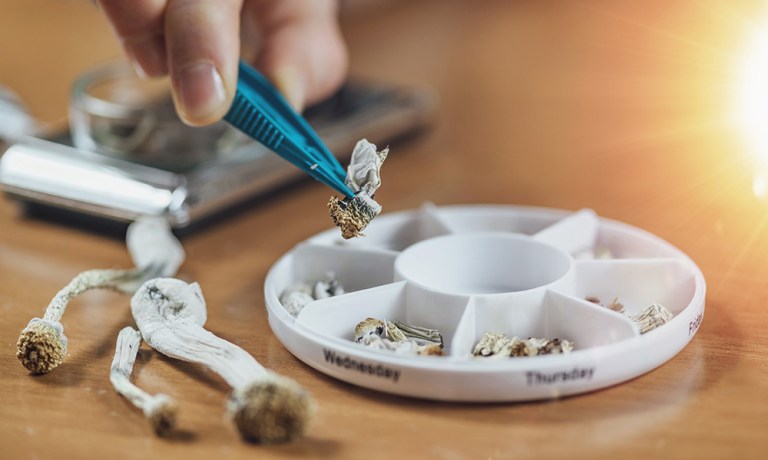

Why Okanagan cannabis shops aren’t dominating the black market
Law abiding cannabis companies in the Okanagan deal with the government taking its piece of the pie at every turn, while trying to compete with a black market that’s still going strong.
Cannabis in B.C. gets taxed at several points between grower and consumer, is restricted by packaging and advertising regulations, on top of other fees. People in the business are speaking out about how these regulations are hurting the legal industry and giving illegal weed an advantage.
Ross Rebagliati, Olympic snowboarder turned cannabis entrepreneur, owns the weed brand Ross’ Gold based in Penticton. He said regulations are strangling the industry, especially for smaller companies.
“It’s literally been stifling for 99 per cent of the companies out there,” he said. “There’s so many fees and regulations that cost money and… it’s a full time job just doing the paperwork.”
Rebagliati said the illegal market is never going away entirely, but reducing excise taxes, eliminating the 15 per cent proprietary fee for direct delivery and making it easier to package weed products would help legal companies compete.
“You take a look at any industry and there’s black market cars, stolen cars, there’s black market cigarettes, you name it. There’s a black market for almost any product,” he said. “The black market’s never going to go away but I think there’s a way where the government can still make money without gouging the producers.”
There are studies and anecdotes about the illicit pot market and its prevalence in Canada, but the fact that committing crime is often a shadowy endeavour makes it difficult to say exactly how many people get their weed illegally.
“It’s hard to put it into numbers because there aren’t really any numbers to count on as far as how much product the black market is moving,” Rebagliati said.
A study out of the University of Waterloo published this year looked at the transition from the black market to the legal market five years after cannabis was legalized.
The study estimated that the legal market capture is around 78 per cent, with $5.23 billion spent on legal weed and $1.49 billion spent on illegal weed in Canada 2022. The study acknowledges that it’s difficult to get current, accurate data on illegal cannabis so it used supply and demand estimates along with other data to make its estimate.
Rebagaliati said 22 per cent might not seem like a lot, but converting that business to the legal market would help cannabis companies that are scraping to get by.
“It is a big chunk,” he said. “Reducing the cost to the producers from top to bottom, would definitely help bring more people into the regulated stores.”
He said that a kilogram of craft cannabis generates more tax income than its actual value since it gets taxed when a producer sells it to a processor, from the processor to the retailer and from the retailer to the consumer, plus any applicable additional fees.
“If you take a kilo of flower… by the time it hits the consumer, that one kilo has generated like seven times what that kilo is worth just in taxes,” Rebagaliati said.
The BC Chamber of Commerce said the level of taxation makes it easy for illegal cannabis to undercut legal prices and that is one of the biggest contributors to struggles in the industry.
“The federal excise tax structure of $1 per gram was established with the assumption that the average wholesale price would be $10 per gram. However, the average retail price in 2024 was $4.82 per gram, meaning the industry is taxed at more than three times the intended rate,” the chamber said in a press release.
Cannabis sales in Canada hit roughly $5.2 billion in the 2023-2024 fiscal year. Federal and provincial governments made around $2.2 billion from cannabis, while they made $15.7 billion from alcohol, according to Statistics Canada.
The B.C. government made around $288 million from the cannabis industry in the 2023-2024 fiscal year through authorities like the BC Liquor Distribution Branch and taxes, according to Statistics Canada.
Rebagaliati said the price of pot has come down significantly since legalization in the legal and illegal market, but black market producers can have a bigger profit margin since they don’t have to deal with fees, taxation and redundant regulations.
“Since legalization, prices have come down in the black market as well, but the better (illegal) producers are still getting a fair price for a pound compared to the legal market. So they’re thriving,” he said.
Jaimie Miller-Haywood is a spokesperson for a cannabis industry lobby in South Okanagan and she said that if the legal market falls apart, the black market will be right there to step in.
“If the licensed industry collapses, because it’s on the verge all across the country, then I promise you the underground is going to do just fine. Maybe that sounds too much like a threat, but let’s be real here, consumers aren’t going to stop consuming weed. We already see that, whether they go through licensed means or not, consumers are going to continue consuming,” she said.
News from © iNFOnews.ca, . All rights reserved.
This material may not be published, broadcast, rewritten or redistributed.

Join the Conversation!
Want to share your thoughts, add context, or connect with others in your community?
You must be logged in to post a comment.







